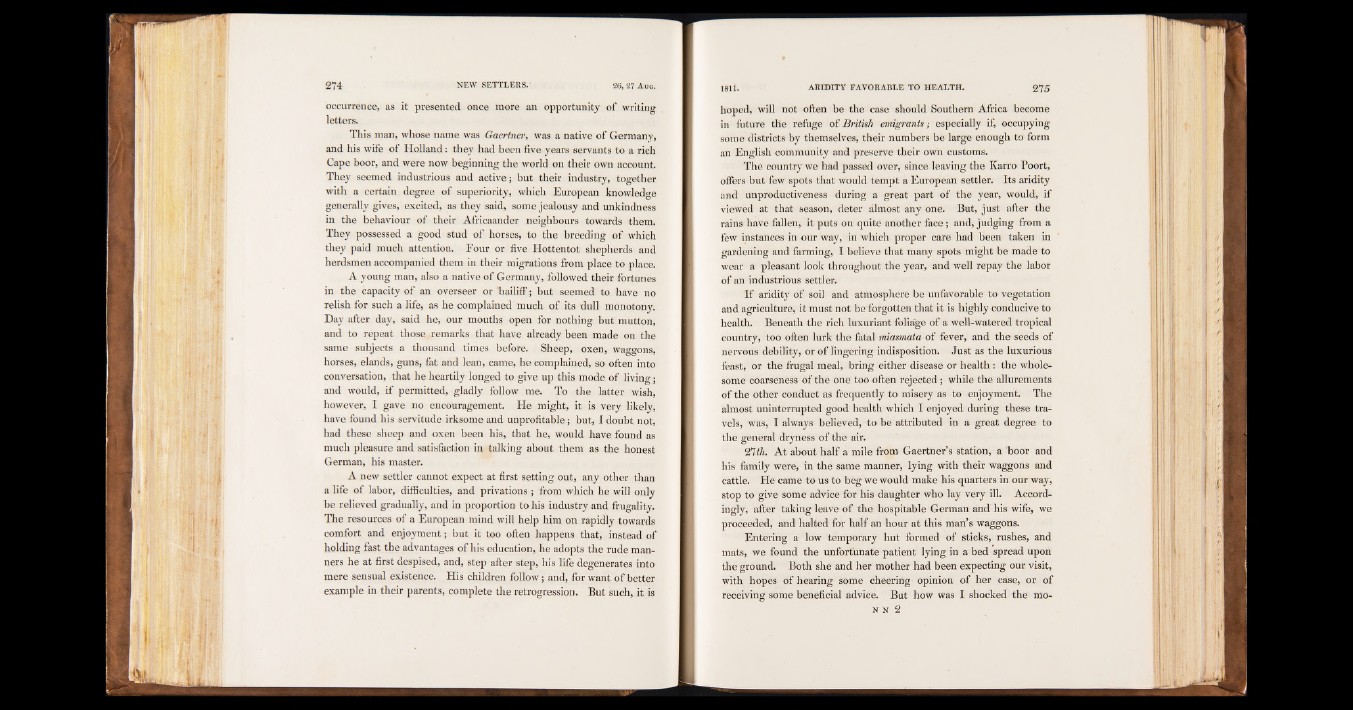
occurrence, as it presented once more an opportunity of writing
letters.
This man, whose name was Gaertner, was a native of Germany,
and his wife of Holland: they had been five years servants to a rich
Cape boor, and were now beginning the world on their own account.
They seemed industrious and active; but their industry, together
with a certain degree of superiority, which European knowledge
generally gives, excited, as they said, some jealousy and unkindness
in the behaviour of their Afrjcaander neighbours towards them.
They possessed a good stud of horses, to the breeding of which
they paid much attention. Four or five Hottentot shepherds and
herdsmen accompanied them in their migrations from place to place.
A young man, also a native of Germany, followed their fortunes
in the capacity of an overseer or bailiff; but seemed to have no
relish for such a life, as he complained much of its dull monotony.
Day after day, said he, our mouths open for nothing but mutton,
and to repeat those remarks that have already been made on the
same subjects a thousand times before. Sheep, oxen, waggons,
horses, elands, guns, fat and lean, came, he complained, so often into
conversation, that he heartily longed to give up this mode of living;
and would, if permitted, gladly follow me. ' To the latter wish,
however, I gave no encouragement. He might, it is very likely,
have found his servitude irksome and unprofitable; but, I doubt not,
had these sheep and oxen been his, that he, would have found as
much pleasure and satisfaction in talking about them as the honest
German, his master.
A new settler cannot expect at first setting out, any other than
a life of labor, difficulties, and privations ; from which he will only
be relieved gradually, and in proportion to his industry and frugality.
The resources of a European mind will help him on rapidly towards
comfort and enjoyment; but it too often happens that, instead of
holding fast the advantages of his education, he adopts the rude manners
he at first despised, and, step after step, his life degenerates into
mere sensual existence. His children follow; and, for want of better
example in their parents, complete the retrogression. But such, it is
hoped, will not often be the case should Southern Africa become
in future the refuge of British emigrants; especially if, occupying
some districts by themselves, their numbers be large enough to form
an English community and preserve their own customs.
The country we had passed over, since leaving the Karro Poort,
offers but few spots that would tempt a European settler. Its aridity
and unproductiveness during a great part of the year, would, if
viewed at that season, deter almost any one. But, just after the
rains have fallen, it puts on quite another face; and, judging from a
few instances in our way, in which proper care had been taken in
gardening and farming, I believe that many spots might be made to
wear a pleasant look throughout the year, and well repay the labor
of an industrious settler.
If aridity of soil and atmosphere be unfavorable to vegetation
and agriculture, it must not be'forgotten that it is highly conducive to
health. Beneath the rich luxuriant foliage of a well-watered tropical
country, too often lurk the fatal miasmata of fever, and the seeds of
nervous debility, or of lingering indisposition. Just as the luxurious
feast, or the frugal meal, bring either disease or health : the wholesome
coarseness of the one too often rejected; while the allurements
of the other conduct as frequently to misery as to enjoyment. The
almost uninterrupted good health which I enjoyed during these travels,
was, I always believed, to be attributed in a great degree to
the general dryness of the air.
2,7th. At about half a mile from Gaertner’s station, a boor and
his family were, in the same manner, lying with their waggons and
cattle. He came to us to beg we would make his quarters in our way,
stop to give some advice for his daughter who lay very ill. Accord-
ingly, after taking leave of the hospitable German and his wife, we
proceeded, and halted for half an hour at this man’s waggons.
Entering a low temporary hut formed o f sticks, rushes, and
mats, we found the unfortunate patient lying in a bed spread upon
the ground. Both she and her mother had been expecting our visit,
with hopes of hearing some cheering opinion of her case, or of
receiving some beneficial advice. But how was I shocked the mo-
N N 2